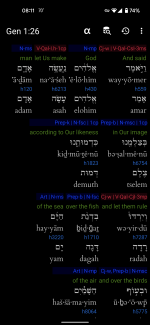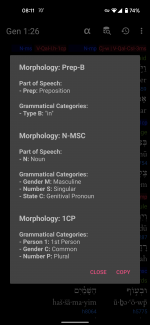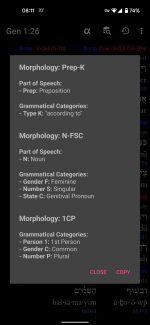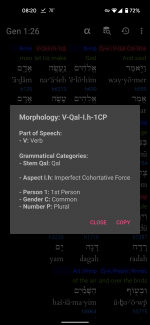YourWordIsTruth
New member
In the very first verse of the Book of Beginnings, Genesis, we read:
“In the beginning, God created the heavens and the earth”
The Hebrew for “God”, is “אֱלֹהִ֑ים”, which is masculine, plural; and “created”, is “בָּרָ֣א”, which is masculine, singular, and is literally, “He created”.
Some have argued that the plural “אֱלֹהִ֑ים”, is for “plural of majesties”, as a king or queen would say “we”. There is no Biblical evidence to support this, which is used by those who oppose the Bible’s teaching of the Holy Trinity.
In Genesis 1:26-27, we read:
“Then God said, “Let Us make man in Our image, according to Our likeness; let them have dominion over the fish of the sea, over the birds of the air, and over the cattle, over all the earth and over every creeping thing that creeps on the earth.”. So God created man in His own image; in the image of God He created him; male and female He created them”
Here we have “אֱלֹהִ֑ים” as the Speaker, Who says, “נַֽעֲשֶׂ֥ה” (let US make, plural), man, “בְּצַלְמֵ֖נוּ” (in OUR Image, plural), “כִּדְמוּתֵ֑נוּ” (according to OUR Likeness).
Those who reject the Teaching of the Holy Trinity: One God, in Three distinct “Persons”, The Father, The Son, and The Holy Spirit, Who are completely equal, as Creators, have tried to explain this. We have the Palestinian Aramaic Targum, “ And the Lord said to the angels who ministered before Him, who had been created in the second day of the creation of the world, Let us make man in Our image, in Our likeness”. And, in the Jewish Study Bible, “The plural construction (Let us . . . ) most likely reflects a setting in the divine council (cf. 1 Kings 22.19-22; Isa. ch 6; Job chs 1-2): God the King announces the proposed course of action to His cabinet of subordinate deities, though He alone retains the power of decision”
It is interesting that neither explanation argues for “plural of majesties”, in the language used in this verse. The Targum says that God is speaking to His “angels”, when He uses the plural, “let US…OUR”. But, in the next verse, this same Targum reads, “And the Lord created man in His likeness: In the image of the Lord He
created him”, which contradicts what they read in verse 26, as it is clear that humans are created in the Image and Likeness of GOD, and not God, and His created angels! The Jewish Study Bible is interesting, as it says that God is speaking here to His, “divine council…to His cabinet of subordinate deities”, which shows that there is one God and there are other “gods”, which is not Monotheistic! The Jerusalem Targum is even more interesting in verse 27, “And the Word of the Lord created man in His likeness, in the likeness of the presence of the Lord He created him”. Creation of humans is by “the Word of the Lord”, which is what John 1:1-3 says!
In Isaiah 51:13, we read, “And forget Yahweh your Maker, that has stretched forth the heavens, and laid the foundations of the earth”. Here “Maker”, in the Hebrew is, “עֹשֶׂ֗ךָ”, which is masculine singular. However, in 54:5, we read, “For your Maker is your husband; Yahweh of hosts is His Name”. Here, “Maker” is the Hebrew, “עֹשַׂיִךְ”, which is masculine, plural, “Makers”! And, in Ecclesiastes 12:1, where it reads, “Remember now your Creator in the days of your youth”, here also the Hebrew, “אֶת־בּוֹרְאֶיךָ”, is masculine, plural, literally, “your Creators”. Whereas, in Isaiah 40:28, and 43:15, we have, “בּרא”, which is singular. Clearly, the use of the plural means more than One Person. It is not used in the sense of “majesties”, as if the singular does not speak of the “Majesty” of the Great God of the Bible!
Creation, in the Old Testament, is clearly the Work of The Three Persons of the Holy Trinity.
God The Father:
“Who hath wrought and done it, calling the generations from the beginning? I the LORD, the first, and with the last; I am” (Isaiah 41:4)
“Thus saith God the LORD, he that created the heavens, and stretched them out; he that spread forth the earth” (Isaiah 42:5)
“Thus saith the LORD the King of Israel, and his redeemer the LORD of hosts; I am the first, and I am the last; and beside me there is no God” (Isaiah 44:6)
“For thus saith the LORD that created the heavens; God himself that formed the earth and made it; he hath established it, he created it not in vain, he formed it to be inhabited: I am the LORD; and there is none else” (Isaiah 45:18)
As we shall see, what is said of the Father, is also said of Jesus Christ, and the Holy Spirit.
God The Son:
Isaiah 48:1-17
The words in this verse are like those found in verse 3, “I have declared the former things from the beginning”, and verse 5, “I have even from the beginning declared it to you”. In verse 12 and 13 the Speaker says, “Listen to Me, O Jacob and Israel, My called; I am He, I am the First, I also am the Last. My hand has also laid the foundation of the earth, and My right hand spread out the heavens”. In verse 15 we read, “I, even I have spoken, yes, and I have called him”. In the very next verse, we read, “Thus says YHWH, your Redeemer, The Holy One of Israel: “I am YHWH your God, Who teaches you to profit, Who leads you by the way you should go”.
Then, in verse 16, The Speaker, Who is Yahweh, says:
“Draw near to Me, hearken to this; in the beginning I did not speak in secret, from the time it was, there was I, and now, the Lord God has sent Me, and His Spirit” (This is the order of words in the Hebrew, Greek and Latin Old Testament)
The Hebrew verb “שְׁלָחַנִי” is masculine, singular, 3rd person, “He has sent Me”.
The Speaker can only be The Eternal, Creator God. Making the Speaker in chapter 48, verses 1-17, a distinct “Person/Individual”, Who is also Yahweh. He is “sent” by “'Adônây YHWH”, and therefore cannot be the same “Person/Individual”, as the Sender. We have TWO Who are equally Yahweh, BOTH Creators.
God The Holy Spirit:
Job 33:4
“The Spirit of God has made me, and the breath of the Almighty gives me life.” (ESV, Hebrew-English Old Testament)
“The spirit of God hath made me, And the breath of the Almighty given me life.” (The Holy Scriptures According to the Masoretic Text, A New Translation. The Jewish Publication Society of America. 5677-1917)
“The Spirit of God hath made me, and the breath of the Almighty hath given me life” (Dr A Benisch; Jewish School and Family Bible, Vol. IV)
“The spirit of God formed me; The breath of Shaddai sustains me” (The Jewish Study Bible)
In the Hebrew we have “עָשָׂ֑תְנִי”, which is literally, “she has made me”. Not because the Holy Spirit is “female”, but, for grammatical agreement of gender, with, “רוּח” (Spirit), which is also feminine. It makes it clear, that here reference is not to “God”, but rather to “the Spirit”, Who is the Creator.
“made”, from the Hebrew verb, “עֲשׂוֹת”, which is used in Genesis 1
“in the beginning God created (בָּרָא) the heavens and the earth…God made (עֲשׂוֹת) the expanse” (Genesis 1:1, 7)
Note in this verse from Job, that “רוּח” (Spirit) is distinct from “נשׁמה” (breath), which is seen in Genesis 2:7, “And the LORD God formed man of the dust of the ground, and breathed into his nostrils the breath (נשׁמה)of life; and man became a living soul”. Job 33:4, is a clear reference to Genesis 2:7, which shows that the Holy Spirit Himself is “the LORD God”.
“The Divine Spirit is that which formed me, and the breath of the Almighty that which teaches me.” (Lancelot Brenton, The Septuagint in Greek and English)
Job 26:13
“By His Spirit He adorned the heavens; His hand pierced the fleeing serpent” (NKJV)
“שִׁפְרָ֑ה”, is in the feminine, singular, literally, “she made beautiful”, because here, like in 33:4, the feminine is for grammatical agreement of gender, with, “רוּח” (Spirit).The Hebrew lexicon by Gesenius reads: “by his (God’s) Spirit the heavens were made brightness,” i.e. splendid, most splendid”
Some versions of the Bible here translate “רוּח”, as “breath”, or “wind”, which are both wrong in this context, as the grammar shows that “רוּח” is Personal, as the Creator. The Jewish Bible here reads:
“By his spirit he hath garnished the heavens ; his hand hath pierced the fleeing serpent” (Dr A Benisch; Jewish School and Family Bible, Vol. IV)
And, the Latin and Syriac, made from the Hebrew, read:
“His spirit has adorned the heavens, and his birthing hand has brought forth the winding serpent” (Latin Vulgate)
“By his spirit he manages the heavens; his hand slew the fleeing serpent” (Syriac Peshetta)
The Creative Word of the Holy Spirit in “the heavens”. Yet we read that the “heavens” are the Work of Yahweh, “And forget Yahweh your maker, that has stretched forth the heavens, and laid the foundations of the earth” (Isaiah 51:13)
In this verse we have the same Hebrew word used in Job 33:4, “עֲשׂוֹת” (made). Both verses from Job are clear that the Holy Spirit also Created the “heavens and the earth”.
Here we have Old Testament evidence for The Holy Trinity in Creation. The “distinction” of the “Persons”, is clear from Isaiah 48:16, where the Sender, Who is Yahweh, Sends another, Who is also Yahweh, and the Holy Spirit.
“In the beginning, God created the heavens and the earth”
The Hebrew for “God”, is “אֱלֹהִ֑ים”, which is masculine, plural; and “created”, is “בָּרָ֣א”, which is masculine, singular, and is literally, “He created”.
Some have argued that the plural “אֱלֹהִ֑ים”, is for “plural of majesties”, as a king or queen would say “we”. There is no Biblical evidence to support this, which is used by those who oppose the Bible’s teaching of the Holy Trinity.
In Genesis 1:26-27, we read:
“Then God said, “Let Us make man in Our image, according to Our likeness; let them have dominion over the fish of the sea, over the birds of the air, and over the cattle, over all the earth and over every creeping thing that creeps on the earth.”. So God created man in His own image; in the image of God He created him; male and female He created them”
Here we have “אֱלֹהִ֑ים” as the Speaker, Who says, “נַֽעֲשֶׂ֥ה” (let US make, plural), man, “בְּצַלְמֵ֖נוּ” (in OUR Image, plural), “כִּדְמוּתֵ֑נוּ” (according to OUR Likeness).
Those who reject the Teaching of the Holy Trinity: One God, in Three distinct “Persons”, The Father, The Son, and The Holy Spirit, Who are completely equal, as Creators, have tried to explain this. We have the Palestinian Aramaic Targum, “ And the Lord said to the angels who ministered before Him, who had been created in the second day of the creation of the world, Let us make man in Our image, in Our likeness”. And, in the Jewish Study Bible, “The plural construction (Let us . . . ) most likely reflects a setting in the divine council (cf. 1 Kings 22.19-22; Isa. ch 6; Job chs 1-2): God the King announces the proposed course of action to His cabinet of subordinate deities, though He alone retains the power of decision”
It is interesting that neither explanation argues for “plural of majesties”, in the language used in this verse. The Targum says that God is speaking to His “angels”, when He uses the plural, “let US…OUR”. But, in the next verse, this same Targum reads, “And the Lord created man in His likeness: In the image of the Lord He
created him”, which contradicts what they read in verse 26, as it is clear that humans are created in the Image and Likeness of GOD, and not God, and His created angels! The Jewish Study Bible is interesting, as it says that God is speaking here to His, “divine council…to His cabinet of subordinate deities”, which shows that there is one God and there are other “gods”, which is not Monotheistic! The Jerusalem Targum is even more interesting in verse 27, “And the Word of the Lord created man in His likeness, in the likeness of the presence of the Lord He created him”. Creation of humans is by “the Word of the Lord”, which is what John 1:1-3 says!
In Isaiah 51:13, we read, “And forget Yahweh your Maker, that has stretched forth the heavens, and laid the foundations of the earth”. Here “Maker”, in the Hebrew is, “עֹשֶׂ֗ךָ”, which is masculine singular. However, in 54:5, we read, “For your Maker is your husband; Yahweh of hosts is His Name”. Here, “Maker” is the Hebrew, “עֹשַׂיִךְ”, which is masculine, plural, “Makers”! And, in Ecclesiastes 12:1, where it reads, “Remember now your Creator in the days of your youth”, here also the Hebrew, “אֶת־בּוֹרְאֶיךָ”, is masculine, plural, literally, “your Creators”. Whereas, in Isaiah 40:28, and 43:15, we have, “בּרא”, which is singular. Clearly, the use of the plural means more than One Person. It is not used in the sense of “majesties”, as if the singular does not speak of the “Majesty” of the Great God of the Bible!
Creation, in the Old Testament, is clearly the Work of The Three Persons of the Holy Trinity.
God The Father:
“Who hath wrought and done it, calling the generations from the beginning? I the LORD, the first, and with the last; I am” (Isaiah 41:4)
“Thus saith God the LORD, he that created the heavens, and stretched them out; he that spread forth the earth” (Isaiah 42:5)
“Thus saith the LORD the King of Israel, and his redeemer the LORD of hosts; I am the first, and I am the last; and beside me there is no God” (Isaiah 44:6)
“For thus saith the LORD that created the heavens; God himself that formed the earth and made it; he hath established it, he created it not in vain, he formed it to be inhabited: I am the LORD; and there is none else” (Isaiah 45:18)
As we shall see, what is said of the Father, is also said of Jesus Christ, and the Holy Spirit.
God The Son:
Isaiah 48:1-17
The words in this verse are like those found in verse 3, “I have declared the former things from the beginning”, and verse 5, “I have even from the beginning declared it to you”. In verse 12 and 13 the Speaker says, “Listen to Me, O Jacob and Israel, My called; I am He, I am the First, I also am the Last. My hand has also laid the foundation of the earth, and My right hand spread out the heavens”. In verse 15 we read, “I, even I have spoken, yes, and I have called him”. In the very next verse, we read, “Thus says YHWH, your Redeemer, The Holy One of Israel: “I am YHWH your God, Who teaches you to profit, Who leads you by the way you should go”.
Then, in verse 16, The Speaker, Who is Yahweh, says:
“Draw near to Me, hearken to this; in the beginning I did not speak in secret, from the time it was, there was I, and now, the Lord God has sent Me, and His Spirit” (This is the order of words in the Hebrew, Greek and Latin Old Testament)
The Hebrew verb “שְׁלָחַנִי” is masculine, singular, 3rd person, “He has sent Me”.
The Speaker can only be The Eternal, Creator God. Making the Speaker in chapter 48, verses 1-17, a distinct “Person/Individual”, Who is also Yahweh. He is “sent” by “'Adônây YHWH”, and therefore cannot be the same “Person/Individual”, as the Sender. We have TWO Who are equally Yahweh, BOTH Creators.
God The Holy Spirit:
Job 33:4
“The Spirit of God has made me, and the breath of the Almighty gives me life.” (ESV, Hebrew-English Old Testament)
“The spirit of God hath made me, And the breath of the Almighty given me life.” (The Holy Scriptures According to the Masoretic Text, A New Translation. The Jewish Publication Society of America. 5677-1917)
“The Spirit of God hath made me, and the breath of the Almighty hath given me life” (Dr A Benisch; Jewish School and Family Bible, Vol. IV)
“The spirit of God formed me; The breath of Shaddai sustains me” (The Jewish Study Bible)
In the Hebrew we have “עָשָׂ֑תְנִי”, which is literally, “she has made me”. Not because the Holy Spirit is “female”, but, for grammatical agreement of gender, with, “רוּח” (Spirit), which is also feminine. It makes it clear, that here reference is not to “God”, but rather to “the Spirit”, Who is the Creator.
“made”, from the Hebrew verb, “עֲשׂוֹת”, which is used in Genesis 1
“in the beginning God created (בָּרָא) the heavens and the earth…God made (עֲשׂוֹת) the expanse” (Genesis 1:1, 7)
Note in this verse from Job, that “רוּח” (Spirit) is distinct from “נשׁמה” (breath), which is seen in Genesis 2:7, “And the LORD God formed man of the dust of the ground, and breathed into his nostrils the breath (נשׁמה)of life; and man became a living soul”. Job 33:4, is a clear reference to Genesis 2:7, which shows that the Holy Spirit Himself is “the LORD God”.
“The Divine Spirit is that which formed me, and the breath of the Almighty that which teaches me.” (Lancelot Brenton, The Septuagint in Greek and English)
Job 26:13
“By His Spirit He adorned the heavens; His hand pierced the fleeing serpent” (NKJV)
“שִׁפְרָ֑ה”, is in the feminine, singular, literally, “she made beautiful”, because here, like in 33:4, the feminine is for grammatical agreement of gender, with, “רוּח” (Spirit).The Hebrew lexicon by Gesenius reads: “by his (God’s) Spirit the heavens were made brightness,” i.e. splendid, most splendid”
Some versions of the Bible here translate “רוּח”, as “breath”, or “wind”, which are both wrong in this context, as the grammar shows that “רוּח” is Personal, as the Creator. The Jewish Bible here reads:
“By his spirit he hath garnished the heavens ; his hand hath pierced the fleeing serpent” (Dr A Benisch; Jewish School and Family Bible, Vol. IV)
And, the Latin and Syriac, made from the Hebrew, read:
“His spirit has adorned the heavens, and his birthing hand has brought forth the winding serpent” (Latin Vulgate)
“By his spirit he manages the heavens; his hand slew the fleeing serpent” (Syriac Peshetta)
The Creative Word of the Holy Spirit in “the heavens”. Yet we read that the “heavens” are the Work of Yahweh, “And forget Yahweh your maker, that has stretched forth the heavens, and laid the foundations of the earth” (Isaiah 51:13)
In this verse we have the same Hebrew word used in Job 33:4, “עֲשׂוֹת” (made). Both verses from Job are clear that the Holy Spirit also Created the “heavens and the earth”.
Here we have Old Testament evidence for The Holy Trinity in Creation. The “distinction” of the “Persons”, is clear from Isaiah 48:16, where the Sender, Who is Yahweh, Sends another, Who is also Yahweh, and the Holy Spirit.




